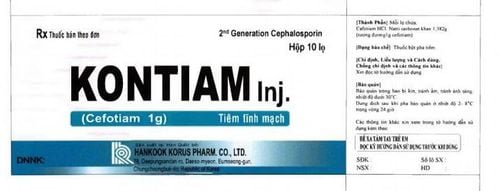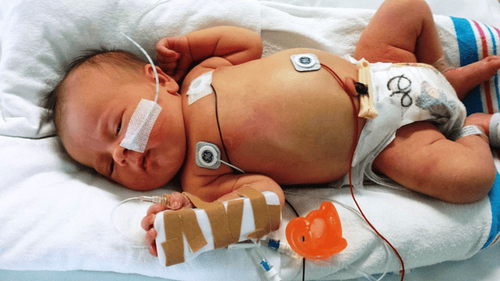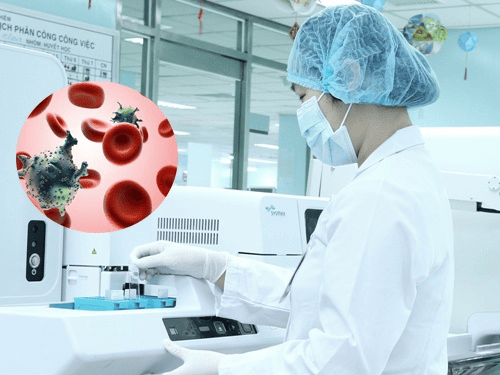This is an automatically translated article.
The article was professionally consulted by Specialist Doctor I Bui Thi Ha - Pediatrician - Neonatologist - Department of Pediatrics - Neonatology - Vinmec Ha Long International General Hospital.Neonatal sepsis accounts for 10-20% of neonatal diseases. It is the second leading cause of infant death after respiratory distress syndrome. Neonatal sepsis can be treated in large medical centers with neonatal intensive care units (NICUs) and specialized medical staff, but the risk of neonatal mortality remains high. if detected late.
1. What is neonatal sepsis?
Newborns' immune systems aren't fully developed to fight infections like bacteria, viruses, and parasites, so they're more susceptible to certain illnesses than babies. adults and adults. When a child has a neonatal sepsis, hospitalization and intensive care treatment is required to recover.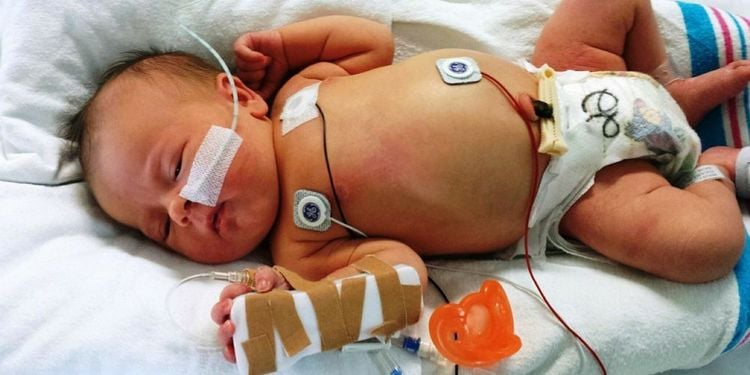
Some common neonatal infections include:
1.1 Group B hemolytic streptococci Group B hemolytic streptococci is a common strain of bacteria that causes a wide range of infections in infants. Babies often get the bacteria from their mothers during delivery – many women carry the bacteria in the rectum or vagina, where the bacteria can be easily passed to the baby if the mother is not treated with antibiotics. Babies infected with group B hemolytic strep often show symptoms of infection within the first week after birth, or some develop symptoms weeks or months later. Depending on the type of infection, symptoms may include breathing or feeding problems, increased body temperature, listlessness or unusual irritability.
1.2 Escherichia coli (E. coli) Escherichia coli is another culprit in neonatal infections, and can lead to: UTIs, sepsis, meningitis, and pneumonia. Everyone carries E. coli in their bodies, and babies can get the infection during vaginal delivery, or from exposure to the bacteria in the hospital or at home. As with other infections, symptoms depend on what type of infection E. coli is causing, but fever, unusual fussiness, lethargy, decreased attention, or loss of appetite are common symptoms. .
1.3 Listeria infection (Listeriosis) Listeria infection can lead to illnesses such as pneumonia, sepsis, and meningitis in infants. Most people contract the bacteria from eating contaminated food because the bacteria are found in soil and water and can infect fruits, vegetables, and even contaminated foods. animal origin such as meat and dairy products. Food that is not properly cleaned, pasteurized or cooked can lead to listeria infection. Babies can be infected from their mother if the mother is infected while pregnant.
1.4 Meningitis Meningitis is an inflammation of the membranes surrounding the brain and spinal cord, caused by viruses, fungi, and bacteria, including listeria, GBS, and E. coli. Babies can acquire these pathogens at birth or from their surroundings, especially if they have a weakened immune system, which makes them more susceptible.
Symptoms of infection in infants are not very specific and may include persistent crying, irritability, sleeping more than usual, lethargy, refusing to feed, low or fluctuating temperature, jaundice, cyanosis, difficulty breathing , rash, vomiting or diarrhea. As the disease progresses, an infant or child with a soft fontanel may show signs of a bulging fontanelle.
1.5 Conjunctivitis Conjunctivitis or pinkeye is an infection that causes the eye to become red and swollen, often with pus discharge. The cause of the disease can be an infection, bacteria or virus in the newborn.
1.6 Sepsis Sepsis is an important infection that involves the spread of disease-causing germs in the blood and body tissues. The cause can be a virus, fungus, parasite or bacteria. Some pathogens are born during birth, others are released from the environment. As with meningitis, the symptoms of sepsis are nonspecific. Slow heart rate, difficulty breathing, jaundice, difficulty feeding, low or unstable body temperature, lethargy can be symptoms of the disease.
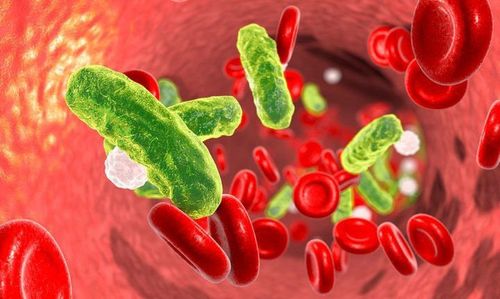
1.7 Congenital infections Many infections can affect a baby through mother-to-child transmission during pregnancy or childbirth. Because these infections are born with the baby, they are often called congenital infections. The main causes of these diseases are viruses and parasites. Congenital infections include: HIV (which causes AIDS), rubella, chickenpox, syphilis, herpes, toxoplasma and cytomegalovirus (CMV), congenital infections are fairly common and are the leading cause of deafness. natural. Some infections, such as GBS and listeria infections, can be acquired from the mother or from the environment after birth.
Babies often get congenital infections if their mothers are infected with pathogens during pregnancy. The risk of babies getting sick often depends on when the mother is exposed to the pathogens. With diseases such as toxoplasmosis and rubella, the risk is highest in the first trimester of pregnancy. If the mother is infected during that time, there is a high risk that the baby will be born with problems such as heart disease, brain damage, deafness, impaired vision or even miscarriage. Having the disease for the rest of your pregnancy can lead to less serious effects such as growth or development problems in the baby.
2. Risk of neonatal infection
Neonatal infections from the environment: children can be transmitted directly or indirectly through mothers, relatives of children, medical staff, not washing hands before contact with babies, through breast milk or through feces. non-sterile medical equipment. On the mother's side: due to the mother's condition with venereal diseases or infections of the genital tract, urinary tract... not being treated promptly or not having enough treatment course. The mother has a fever before, during or 24 hours after giving birth. Amniotic fluid breaks more than 18 hours. The duration of labor is more than 12 hours. Dirty or infected amniotic fluid. On the child's side: the baby's pregnancy failure is not obstetric cause. Babies born with APGAR less than 6 points at 5 minutes. Babies born prematurely or with unexplained low birth weight.
3. Signs of neonatal infection
In order to detect neonatal infection early, parents need to pay attention to the following signs:
Digestive disorders (poor suckling, aborting, distended abdomen, vomiting) Respiratory disorders (rapid breathing, difficulty breathing, moaning) oozing, pauses in breathing) Lethargy, decreased attention. The child has a temperature disorder (fever or hypothermia) Unusual rash or changes in skin color. Persistent crying. Unusual irritability. Puffy, stiff body. A significant change in your baby's behavior, such as a sudden lethargy or inability to fall asleep, could also be signs of abnormality. These signs are more worrisome if the baby is younger than 2 months old. To ensure your baby's good health, see your baby's doctor as soon as you suspect a problem.
4. Neonatal infectious complications
Are neonatal infections dangerous? This is a question that many parents wonder about. Untreated neonatal infections can lead to serious consequences. Because a child's organs are developing so rapidly during this period, any disruption can lead to complications including growth, neurological, cardiovascular, respiratory, and developmental abilities. other sensory problems. In some cases, severe infections can lead to death in children.

5. How to prevent neonatal infection?
Before pregnancy: Pregnant women need to be vaccinated against flu, rubella and chickenpox before becoming pregnant. Wash food thoroughly, wash hands frequently (especially before and after cooking, using the restroom, and after contact with bodily fluids and waste products), and avoiding contact with cats and animal feces to reduce the risk of bacterial and parasitic infections such as listeria and toxoplasmosis. Practice safe sex to avoid sexually transmitted diseases (STDs) that can lead to congenital infections. During pregnancy: If the mother during pregnancy is diagnosed with infections or is at high risk for infections, precautions should be taken to prevent risks to the baby. If the baby unfortunately has an infection in the newborn, parents need to take the child to the hospital as soon as the symptoms mentioned above appear, and at the same time need to calm down to coordinate with the doctors in treatment and care. young. In summary, neonatal sepsis is a disease with a high incidence in infants, because the immune system is still weak, they are not able to cope with infectious agents. Babies born prematurely or who are immunocompromised are at great risk for infections that are not normally a problem. Early diagnosis, prompt treatment, and regular care and monitoring are the best ways to treat a child.
Specialist Doctor I Bui Thi Ha has over 11 years of experience working in the field of Pediatrics - Neonatology; proficiently perform basic pediatric techniques and advanced, intensive and modern techniques such as mechanical ventilation, longline, blood exchange, invasive arterial blood pressure measurement, etc. Currently, the doctor is a Doctor. Pediatrics - Newborns, Vinmec Ha Long International General Hospital
As a key area of Vinmec Health system, Pediatrics Department always brings satisfaction to customers and is highly appreciated by industry experts with :
Gathering a team of leading doctors and nurses in Pediatrics: including leading experts, with high professional qualifications (professor, associate professor, doctorate, master), experienced, each work at major hospitals such as Bach Mai, 108.. The doctors are all well-trained, professional, have a heart - reach, understand young psychology. In addition to domestic pediatric specialists, the Department of Pediatrics also has the participation of foreign experts (Japan, Singapore, Australia, USA) who are always pioneers in applying the latest and most effective treatment regimens. . Comprehensive services: In the field of Pediatrics, Vinmec provides a series of continuous medical examination and treatment services from Newborn to Pediatric and Vaccine,... according to international standards to help parents take care of their baby's health from birth to childhood. from birth to adulthood Specialized techniques: Vinmec has successfully deployed many specialized techniques to make the treatment of difficult diseases in Pediatrics more effective: neurosurgery - skull surgery, stem cell transplantation. blood in cancer treatment. Professional care: In addition to understanding children's psychology, Vinmec also pays special attention to the children's play space, helping them to have fun and get used to the hospital's environment, cooperate in treatment, improve the efficiency of medical treatment.
Please dial HOTLINE for more information or register for an appointment HERE. Download MyVinmec app to make appointments faster and to manage your bookings easily.






